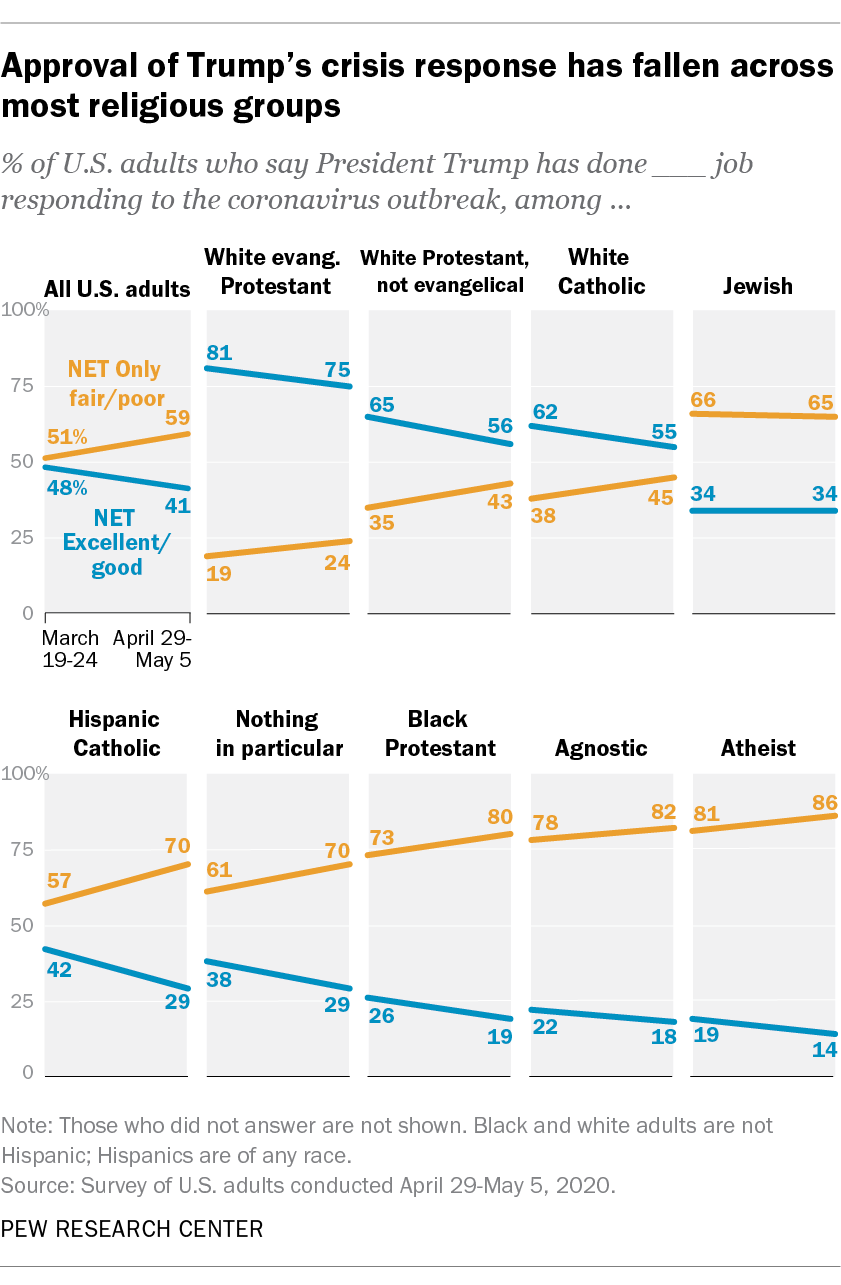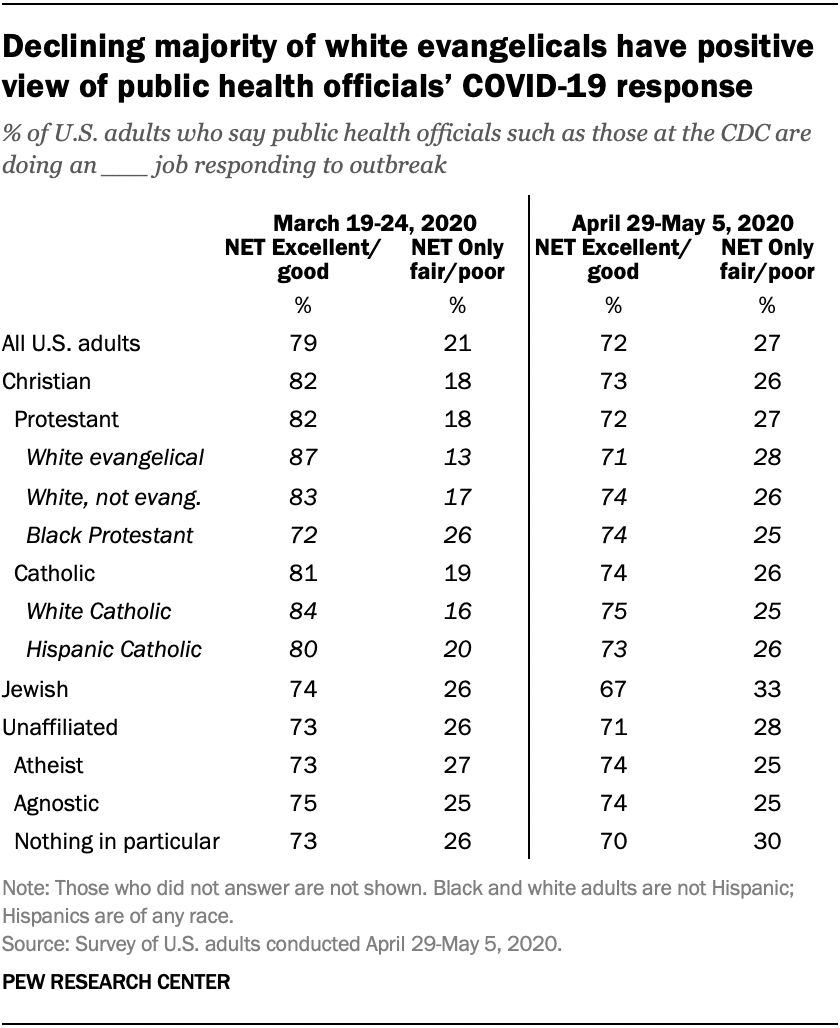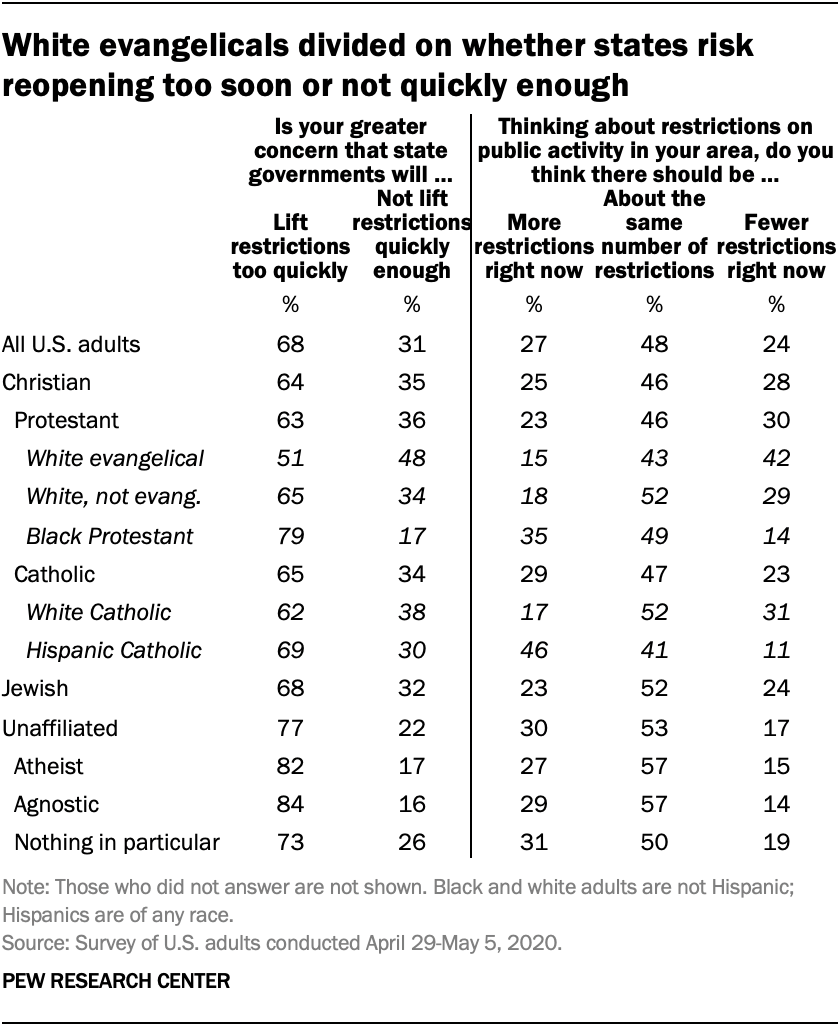
White evangelical Protestants are President Donald Trump’s most supportive religious constituency, but they are slightly less positive about his response to the coronavirus pandemic now than they were in March, according to a new Pew Research Center survey. The decline comes as recommendations for social distancing in the United States stretch into a third month and Americans overall express waning confidence in how the president and public health officials are handling the crisis.
Three-quarters of white evangelical Protestants say Trump is doing an excellent (43%) or good job (32%) responding to the outbreak, according to the survey, conducted April 29 to May 5 among 10,957 U.S. adults. No other religious group comes close to evaluating the president so positively. Even so, the share of white evangelicals who give Trump positive marks for his handling of the crisis is 6 percentage points lower today than when the question was last asked in a survey conducted March 19 to 24.
How we did this
This analysis explores U.S. religious groups’ assessments of how national leaders and government organizations are responding to the coronavirus outbreak. We surveyed 10,957 U.S. adults from April 29 to May 5, 2020. Everyone who took part is a member of Pew Research Center’s American Trends Panel (ATP), an online survey panel that is recruited through national, random sampling of residential addresses. This way nearly all U.S. adults have a chance of selection. The survey is weighted to be representative of the U.S. adult population by gender, race, ethnicity, partisan affiliation, education and other categories. Read more about the ATP’s methodology.
White evangelical Protestants are a strongly Republican constituency, and their declining confidence in the president mirrors a slight decrease among Republicans overall. Today, 77% of those who identify with or lean toward the Republican Party say the president is doing an excellent or good job handling the COVID-19 outbreak, down from 83% who said this in the March survey.
Catholics, who on balance gave Trump positive ratings for his handling of the pandemic in March, now mostly rate his response negatively, with 19% saying Trump has done an “only fair” job and 37% describing his performance as “poor.” Seven-in-ten Hispanic Catholics now have a negative assessment of Trump’s response, compared with 57% in March, while the share of white Catholics who give Trump negative marks has increased to 45%, from 38% in March. (However, on balance, white Catholics still view Trump’s response to the virus positively.)

In addition to growing doubts about the president’s handling of the crisis, white evangelicals and members of many other Christian groups also show signs of wavering confidence in public health officials such as those at the Centers for Disease Control and Prevention (CDC). In the most recent survey, 71% of white evangelical Protestants say they think public health officials are doing an excellent or good job handling the outbreak, down 16 percentage points from 87% who said this in March.
This aligns with the fact that Republicans are less likely than Democrats to approve of health officials’ handling of the crisis: Currently, 68% of Republicans and Republican-leaning independents say public health officials such as those at the CDC have done an excellent or good job in dealing with the outbreak, down from 84% in the March survey. Democrats’ views on public health officials remain stable, with roughly three-quarters expressing a positive opinion.

The new survey also asked Americans about another widely debated issue: restrictions on public activity.
Some stay-at-home orders that were imposed by states in March and April were just starting to be eased when the survey was conducted (though public health officials have since warned about the risks of lifting restrictions too soon). Overall, two-thirds of Americans (68%) say their bigger concern is that states will begin lifting restrictions too soon, while three-in-ten (31%) say their bigger concern is that states will not lift restrictions quickly enough. These findings are similar to those from early April, though views have become somewhat more divided along partisan and ideological lines over the last month.
White evangelicals are more inclined than other religious groups to say their bigger concern is that restrictions will not be lifted quickly enough – as opposed to lifted too quickly – and that there should be fewer restrictions in their local area than are currently in place. Still, around half of white evangelicals (51%) say their bigger concern is that restrictions will be lifted too quickly. And nearly six-in-ten white evangelical Protestants say that the restrictions in their area should either remain as they are now (43%) or be increased (15%).
Although respondents were not asked their opinion about restrictions on religious activity specifically, limits on services held by houses of worship have been a contentious topic during the outbreak.
Note: Here are both sets of the questions used for this report, along with responses, and its methodology. Here is a detailed table of results.
